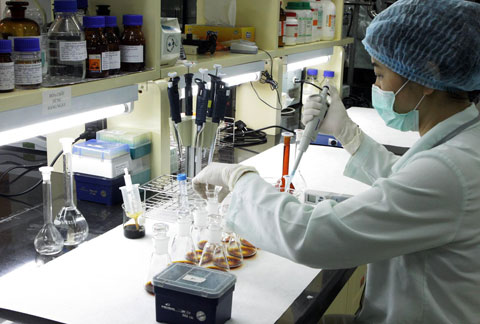
The Science and Technology Journalists' Club announced the schdule for Viet Nam's top 10 science and technology events in 2014 in Ha Noi on December 24. The events are chosen based in six fields, including mechanism and policy, social sciences and humanities, fundamental research, applied research, international cooperation and honouring scientists.
The Science and Technology Journalists' Club announced the schdule for Viet Nam's top 10 science and technology events in 2014 in Ha Noi on December 24. The events are chosen based in six fields, including mechanism and policy, social sciences and humanities, fundamental research, applied research, international cooperation and honouring scientists.
 |
| Viet Nam becomes the second Asian country, and the fourth nation in the world, to successfully conduct research on, and produce, anti-diarrhea vaccines for children. |
1. Decrees and Circulars issued to enhance the implementation of Law on Science and Technology
The Ministry of Science and Technology submitted six decrees to the government on the instruction of the implementation of the Science and Technology Law. These are meant to create mechanisms and policies to boost the development of science and technology in the country. The Law on Science and Technology, approved by the National Assembly in June 2013, came into effect on January 1, 2014.
2. First-ever Viet Nam Science and Technology Day (May 18) held
The National Assembly approved the Science and Technology Law, which stipulated that the Viet Nam Science and Technology Day will be celebrated every May 18 annually. This year, the event was organised for the first time by the Ministry of Science and Technology under the theme: "Science and Technology – The motivation for fast and sustainable development."
3. Successfully organising an international symposium, entitled "Underwater Archaeology in Vietnam and Southeast Asia"
The Vietnam Academy of Social Sciences cooperated with the southern province of Quang Ngai to organise an international symposium, entitled "Underwater Archaeology in Vietnam and Southeast Asia," which was held in mid-October.
The participating scientists affirmed that Viet Nam has great potential in terms of sunken cultural treasures. In addition, the scientists revealed that the country has faced many difficulties in the research, preservation and promotion of the treasures.
4. Manufacturing steel and unburned materials from red mud
The Institute of Chemistry, under the Vietnam Academy of Science and Technology, carried out a national research project on steel manufacturing and unburned material production using red mud in the manufacturing process of alumina in Central Highlands. The research was part of the National Programme of Scientific and Technological for Socio - Economic Development, known as Tay Nguyen 3 Programme, being conducted from 2011–15.
5. Successfully producing Rotavin-M1, an anti-diarrhea vaccine for children
Viet Nam becomes the second Asian country, and the fourth nation in the world, to successfully conduct research on, and produce, anti-diarrhea vaccines for children.
The vaccine was created by the Centre for Research and Production of Vaccines and Biologicals (POLYVAC).
6. Agricultural Genetics Institute given Outstanding Achievement Awards
The International Atomic Energy Agency (IAEA) presented the Outstanding Achievement Award to the Agricultural Genetics Institute under the Viet Nam Academy of Agricultural Sciences. The institute developed rice and mutant soybean varieties that improved local farmers' livelihoods.
The awards were given to honour the teams of scientists "who have helped increase food security by using radiation to breed better crop varieties."
7. Application of stem cell technology in cancer treatment at Hue Central Hospital
Doctors of the Hue Central Hospital conducted research on the application of stem cell technology in breast cancer and cervical cancer treatment. They used stem cell transplantats to successfully treat a patient suffering from last stage cervical cancer. The operation indicated the success of the research.
8. US–Vietnamese cooperation in nuclear energy for peaceful purposes
Vietnam's Minister of Science and Technology Nguyen Quan and United States Ambassador to Viet Nam David Shear officially signed, on May 6, a bilateral agreement on using nuclear energy for peaceful purposes. - File Photo
Vietnam's Minister of Science and Technology Nguyen Quan and United States Ambassador to Viet Nam David Shear officially signed, on May 6, a bilateral agreement on using nuclear energy for peaceful purposes.
The agreement aimed to adjust the commercial transactions conducted in the nuclear energy field. It was also drafted to create a legal framework for the cooperation between Viet Nam and the United States in research, development and application of nuclear energy.
9. Professor Chau Van Minh elected as a member of the National Academy of Sciences of Belarus
Professor Chau Van Minh, director of Vietnam Academy of Science and Technology, was elected as a new foreign member of the National Academy of Sciences of Belarus. He was recognised for his contribution in the field of chemistry.
10. Three Vietnamese scientists listed in the World's Most Influential Scientific Minds
Three Vietnamese scientists have been recognised as among the World's Most Influential Scientific Minds list compiled by the multinational media and information firm Thomson Reuters.
They are Professor Dam Thanh Son, Professor Nguyen Son Binh and Associate Professor Nguyen Xuan Hung. Son currently teaches physics at the University of Chicago in the United States. Binh has researched and taught at Northwestern University's chemistry faculty, also in the United States. Meanwhile, Hung is a lecturer at the University of Science under the Vietnam National University - HCM City.
(Source: VNS)




